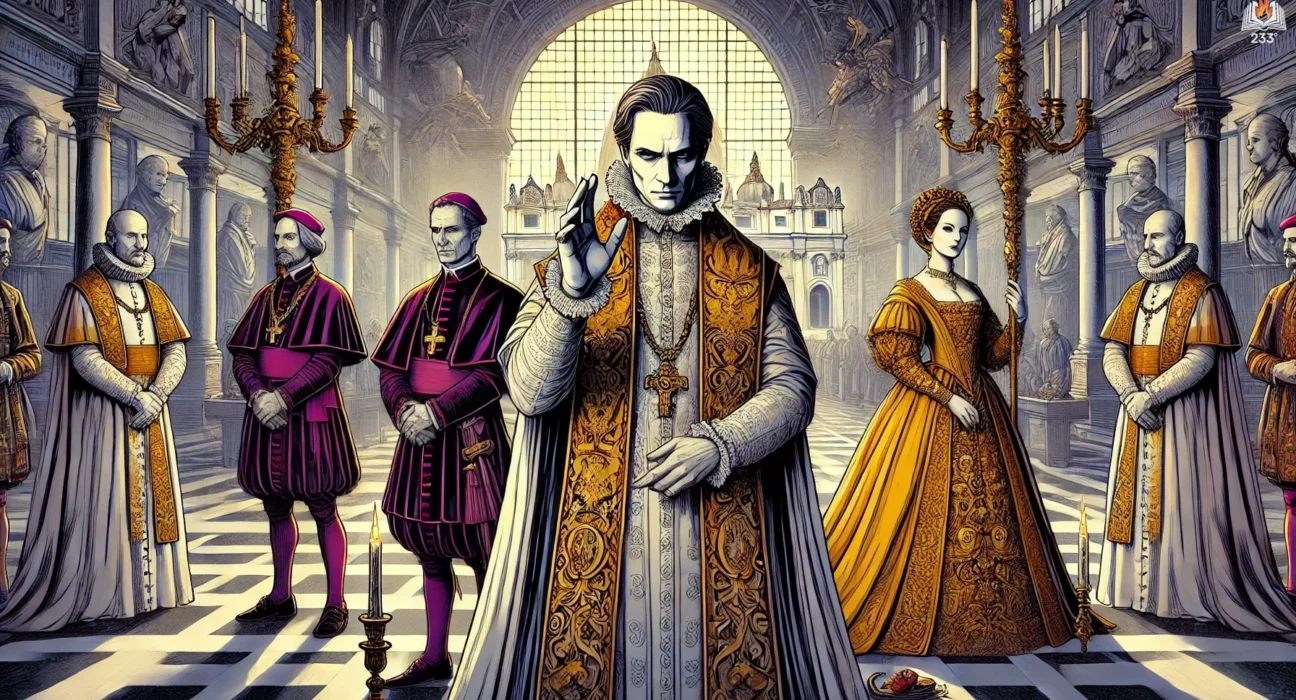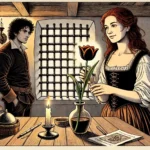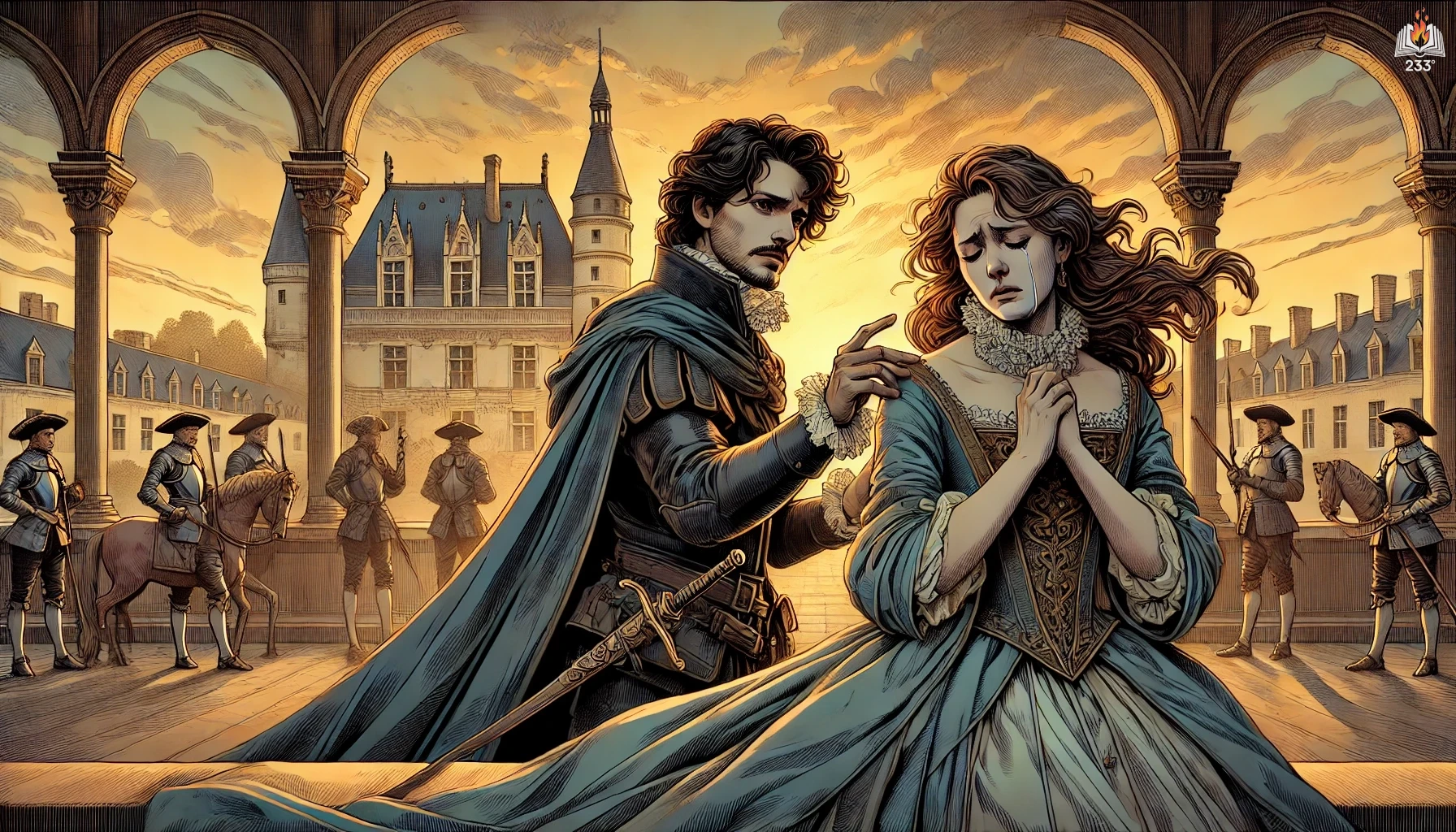The Borgias by Alexandre Dumas, first published in 1840, is a part of Dumas’s “Celebrated Crimes” series, where he explores notorious historical figures and events. This work delves into the infamous Italian Borgia family, known for their political ambition, corruption, and scandal in Renaissance Italy. Dumas takes an investigative and often dramatic look at figures like Rodrigo Borgia, who became Pope Alexander VI, and his children, Cesare and Lucrezia, whose actions forever changed the perception of the papacy and nobility.
Plot Summary
In the late 15th century, the bustling city of Rome is gripped by anticipation as the conclave convenes to elect a new Pope. The Vatican, filled with influential and conniving cardinals, becomes the stage for a political tug-of-war. The powerful Rodrigo Borgia, a Spanish cardinal and master manipulator, is the man who has prepared most thoroughly for this day, having bought the allegiance of several key players. Rodrigo’s ambition knows no bounds, and he has made the bold gamble to ensure his election by offering titles, riches, and even lands to those who would support him. With these bribes and promises, Rodrigo secures the papacy and assumes the name Alexander VI. But the conclave’s decision fills Rome with murmurings of discontent, for many believe Rodrigo’s notorious debauchery and thirst for power bode ill for the Church.
Upon his election, Alexander VI swiftly consolidates his power, building alliances with Italy’s influential families and reinforcing his position against threats within and beyond the church. Yet his real focus lies with his family, particularly his children—Cesare, Juan, and Lucrezia Borgia—whose fates are entwined with his ambitious vision. Cesare, his eldest son, grows up under his father’s guidance, displaying a talent for military strategy and a mind as cunning as Rodrigo’s own. The Pope sees Cesare as his heir in both ambition and ruthlessness, despite Cesare’s position as a cardinal. Meanwhile, Lucrezia, beautiful and perceptive, becomes a pawn in her father’s hands, with her marriage arranged and rearranged to cement alliances as required. Juan, favored as the family’s warrior prince, begins a campaign under Alexander’s orders to conquer the Papal States. However, his impulsiveness and lack of skill quickly sow discord and leave him vulnerable to the region’s complex political rivalries.
As the Borgia name grows ever more powerful, rumors swirl around Rome, whispering of poisonings, betrayals, and illicit relationships. Alexander’s enemies begin to accumulate—bitter rivals and jealous lords eager to see his family fall from grace. Cesare, hardened by his father’s teachings and driven by ambition, begins to outshine his brother, Juan, whose failures reveal his inadequacies. Eventually, this rivalry ends in tragedy when Juan’s body is found floating in the Tiber. Though the death is shrouded in mystery, many suspect Cesare’s involvement, convinced that he saw Juan as a stumbling block to his own ambitions. In a grim twist of fate, Cesare steps out of the shadows as the dominant force within the family, shedding his cardinal robes and donning armor as he takes command of the family’s military forces.
With a new role to match his ambition, Cesare Borgia becomes Alexander’s mightiest instrument, ruthless in his conquests and unyielding in his campaigns. His aspirations, however, extend beyond merely fulfilling his father’s ambitions; he dreams of creating a kingdom of his own, consolidating power across Italy through war and strategy. He uses brutality and shrewd alliances to carve out territory, silencing opposition with swift and deadly force. To further solidify his position, he seizes upon an alliance with the French, gaining their support and wielding their influence to advance his objectives. At the height of his strength, Cesare seems unstoppable, an indomitable force driven by an ambition as vast as Alexander’s vision for their family.
Meanwhile, Lucrezia’s position remains precarious. As a daughter of the Pope, her role is inherently political, and Alexander views her as a valuable asset to the family’s ambitions. Her first husband is forced aside, and she is married off to secure political alliances. Yet Lucrezia is far more than a pawn; beneath her beauty lies a mind as sharp and perceptive as her father’s. Over time, she grows to understand the ruthless nature of her family and learns to navigate the treacherous world around her, where loyalty is a currency and betrayal can strike at any moment. When Alexander orders her to marry Alfonso of Aragon, he intends to reinforce his ties with the Neapolitan crown, but the alliance proves volatile. Cesare, harboring deep jealousy and distrust, quickly turns against Alfonso. In a series of violent encounters, Alfonso becomes a target of Cesare’s wrath, ultimately meeting a violent and untimely end—an act many believe was orchestrated by Cesare himself.
Within Rome, Alexander VI’s papacy reflects his insatiable hunger for control, with power exerted at all costs. He reorganizes the city’s political structure, placing loyalists in key positions and manipulating the noble families. Yet he cannot silence the growing unease. Cardinals, lords, and nobles watch the Borgias with a mixture of awe and dread, wary of the family’s ascendancy. Alexander’s strategy relies heavily on bribery and intimidation, and he uses these tools liberally. Through these machinations, he consolidates his power even as his enemies multiply in the shadows, plotting his downfall.
Cesare’s ambitions, however, stretch too far. Despite his military victories, the tide turns against him as his alliances begin to crumble and his enemies close in. His reliance on the French proves his undoing when their support falters, leaving him vulnerable to an increasingly hostile Italian nobility and the Holy Roman Empire. A series of crushing defeats follows, with Cesare’s once-loyal generals deserting him, and the territories he fought so hard to conquer slipping from his grasp. Alexander, now in failing health, can do little to save his son from the cascading ruin. When the Pope dies, Cesare’s power base crumbles, and his enemies seize the moment to strike. He is ultimately arrested and exiled, a fallen titan stripped of the power he once wielded with an iron fist.
Lucrezia, who has endured her share of family betrayals and political schemes, eventually finds herself free from the Borgia web. She establishes her own influence in Ferrara, where she is married to Alfonso d’Este, Duke of Ferrara. Unlike her father and brother, Lucrezia’s power stems not from conquest but from her intelligence, charm, and resilience. She becomes a respected figure in her own right, distancing herself from her family’s legacy and creating a life shaped by diplomacy and grace rather than ruthlessness.
With Alexander’s death, the Borgia legacy comes to a close, marking the end of one of history’s most infamous families. The family that rose through manipulation and corruption finds its influence erased, its members scattered, its ambition unfulfilled. Cesare, once the terror of Italy, dies in obscurity, and Rome turns the page on an era marked by scandal, treachery, and a power so absolute that it ultimately consumed itself. Lucrezia, though forever linked to the Borgia name, manages to carve out a different path, a testament to her strength amid a family so defined by ambition and violence.
In the end, the Borgias’ story leaves behind a legacy of caution, a tale of power that, in reaching too far, ultimately collapses under the weight of its own ambition.
Main Characters
Rodrigo Borgia (Pope Alexander VI): A cunning, ambitious man whose strategic mind and ruthlessness helped him ascend to the papacy, Alexander VI used his position to secure power and wealth for himself and his family. His life is a paradox of religious authority and moral depravity, embodying the era’s mix of piety and corruption.
Cesare Borgia: The ambitious and often ruthless son of Alexander VI, Cesare is portrayed as a brilliant but brutal military leader, deeply motivated by power and legacy. His relationship with his father reflects both collaboration and competition, and his actions display both charisma and cruelty.
Lucrezia Borgia: Known for her beauty and controversial role in the family’s political maneuvers, Lucrezia was a pawn in her father’s and brother’s schemes. Dumas presents her as a complex character whose relationships and marriages are manipulated to serve the Borgia family’s ambitions.
Vanozza dei Cattanei: Rodrigo Borgia’s mistress and the mother of his children, Vanozza represents a blend of maternal loyalty and the dark allure that surrounded the Borgia family. Her involvement in their lives underscores the complex, and often morally dubious, family dynamics.
Theme
Corruption and Power: The Borgias epitomize the extent of moral corruption driven by the pursuit of power. Rodrigo’s ascent to the papacy, achieved through bribery and manipulation, sets the stage for the broader corruption within the church and political realm, illustrating the destructive nature of unchecked ambition.
Family and Loyalty: Despite their internal conflicts, the Borgias are united by a fierce loyalty to each other. Their alliances and betrayals are often motivated by a twisted sense of familial duty, showing how loyalty can be wielded as a weapon or a weakness.
Religion and Hypocrisy: The story highlights the tension between the spiritual authority of the church and the moral failings of its leaders. Alexander VI’s papacy is characterized by paradoxes, as he embodies both religious sanctity and moral decay, critiquing the hypocrisy within powerful religious institutions.
The Role of Women: Lucrezia, as a member of the Borgia family, endures complex power dynamics and objectification. The novel reflects on how women, even those from powerful families, are often reduced to political pawns, exploring themes of agency, manipulation, and resilience.
Writing Style and Tone
Dumas employs a tone that is both engagingly vivid and darkly dramatic, perfectly suited to the high-stakes political intrigue surrounding the Borgias. His style combines historical narrative with literary embellishment, creating a sense of immediacy and immersion that draws the reader into the Renaissance era. The narrative often takes on a theatrical quality, with dialogue and descriptions that bring the historical characters and their moral conflicts to life.
Dumas’s prose is rich with detail, combining the suspense of a thriller with the reflective tone of historical inquiry. He maintains a critical lens on the Borgias, balancing historical facts with a narrative that highlights the sensational aspects of their lives. His tone is often one of fascinated condemnation, capturing both the allure and repulsion of the Borgias’ actions. This layered storytelling provides readers with a sense of moral ambiguity, prompting them to consider the fine line between ambition and corruption, legacy and infamy.
We hope this summary has sparked your interest and would appreciate you following Celsius 233 on social media:
There’s a treasure trove of other fascinating book summaries waiting for you. Check out our collection of stories that inspire, thrill, and provoke thought, just like this one by checking out the Book Shelf or the Library
Remember, while our summaries capture the essence, they can never replace the full experience of reading the book. If this summary intrigued you, consider diving into the complete story – buy the book and immerse yourself in the author’s original work.
If you want to request a book summary, click here.
When Saurabh is not working/watching football/reading books/traveling, you can reach him via Twitter/X, LinkedIn, or Threads
Restart reading!








